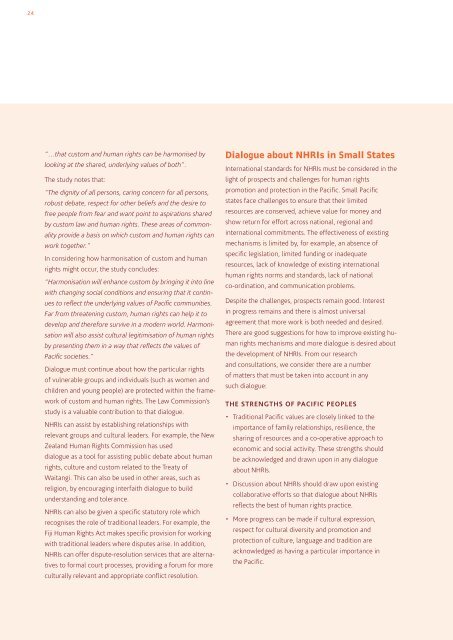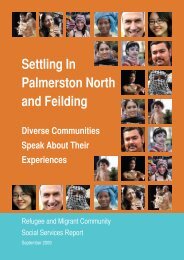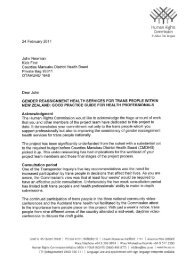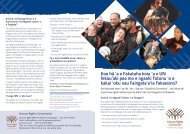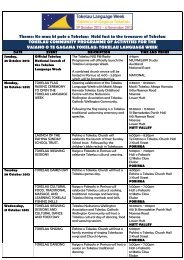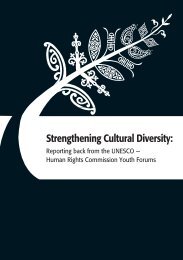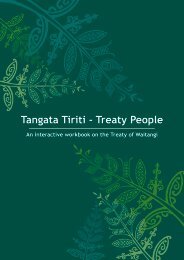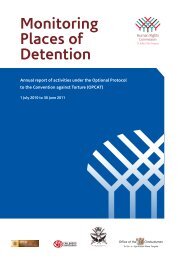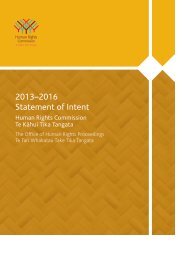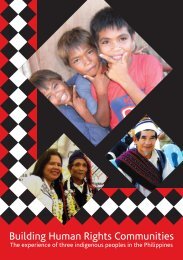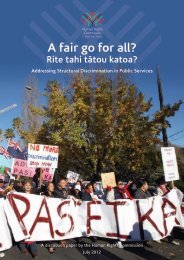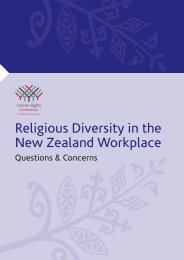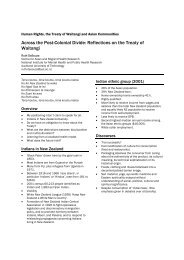National Human Rights Institutions Pathways for Pacific States
National Human Rights Institutions Pathways for Pacific States
National Human Rights Institutions Pathways for Pacific States
- No tags were found...
You also want an ePaper? Increase the reach of your titles
YUMPU automatically turns print PDFs into web optimized ePapers that Google loves.
24“…that custom and human rights can be harmonised bylooking at the shared, underlying values of both”.The study notes that:“The dignity of all persons, caring concern <strong>for</strong> all persons,robust debate, respect <strong>for</strong> other beliefs and the desire tofree people from fear and want point to aspirations sharedby custom law and human rights. These areas of commonalityprovide a basis on which custom and human rights canwork together.”In considering how harmonisation of custom and humanrights might occur, the study concludes:“Harmonisation will enhance custom by bringing it into linewith changing social conditions and ensuring that it continuesto reflect the underlying values of <strong>Pacific</strong> communities.Far from threatening custom, human rights can help it todevelop and there<strong>for</strong>e survive in a modern world. Harmonisationwill also assist cultural legitimisation of human rightsby presenting them in a way that reflects the values of<strong>Pacific</strong> societies.”Dialogue must continue about how the particular rightsof vulnerable groups and individuals (such as women andchildren and young people) are protected within the frameworkof custom and human rights. The Law Commission’sstudy is a valuable contribution to that dialogue.NHRIs can assist by establishing relationships withrelevant groups and cultural leaders. For example, the NewZealand <strong>Human</strong> <strong>Rights</strong> Commission has useddialogue as a tool <strong>for</strong> assisting public debate about humanrights, culture and custom related to the Treaty ofWaitangi. This can also be used in other areas, such asreligion, by encouraging interfaith dialogue to buildunderstanding and tolerance.NHRIs can also be given a specific statutory role whichrecognises the role of traditional leaders. For example, theFiji <strong>Human</strong> <strong>Rights</strong> Act makes specific provision <strong>for</strong> workingwith traditional leaders where disputes arise. In addition,NHRIs can offer dispute-resolution services that are alternativesto <strong>for</strong>mal court processes, providing a <strong>for</strong>um <strong>for</strong> moreculturally relevant and appropriate conflict resolution.Dialogue about NHRIs in Small <strong>States</strong>International standards <strong>for</strong> NHRIs must be considered in thelight of prospects and challenges <strong>for</strong> human rightspromotion and protection in the <strong>Pacific</strong>. Small <strong>Pacific</strong>states face challenges to ensure that their limitedresources are conserved, achieve value <strong>for</strong> money andshow return <strong>for</strong> ef<strong>for</strong>t across national, regional andinternational commitments. The effectiveness of existingmechanisms is limited by, <strong>for</strong> example, an absence ofspecific legislation, limited funding or inadequateresources, lack of knowledge of existing internationalhuman rights norms and standards, lack of nationalco-ordination, and communication problems.Despite the challenges, prospects remain good. Interestin progress remains and there is almost universalagreement that more work is both needed and desired.There are good suggestions <strong>for</strong> how to improve existing humanrights mechanisms and more dialogue is desired aboutthe development of NHRIs. From our researchand consultations, we consider there are a numberof matters that must be taken into account in anysuch dialogue:THE STRENGTHS OF PACIFIC PEOPLES• Traditional <strong>Pacific</strong> values are closely linked to theimportance of family relationships, resilience, thesharing of resources and a co-operative approach toeconomic and social activity. These strengths shouldbe acknowledged and drawn upon in any dialogueabout NHRIs.• Discussion about NHRIs should draw upon existingcollaborative ef<strong>for</strong>ts so that dialogue about NHRIsreflects the best of human rights practice.• More progress can be made if cultural expression,respect <strong>for</strong> cultural diversity and promotion andprotection of culture, language and tradition areacknowledged as having a particular importance inthe <strong>Pacific</strong>.


